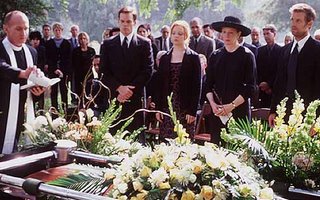Interview with Playwright Craig Wright
posted by Eric Pargac at 3:30 PM
We are again lucky enough to have direct contact with the playwright during the rehearsal process of Grace. We are thrilled that Craig Wright has been open to meeting with us and answering questions as well as sitting in on rehearsals and previews to offer feedback. Such contact with a playwright is invaluable. To help shed some light on Craig Wright's thoughts on Grace, we have once again gotten journalist Ina Rometsch to interview our playwright. Here is an excerpt of her interview with Craig Wright.
Craig, what put the idea for this play into your head?
I heard a story about a love triangle in Florida that operated a little bit like the one in Grace does. Also, I wanted to write a play about someone who reaches the end of their belief system. I wanted to write something that said: There is grace, but grace is a lot weirder than we think.
Steve and Sara are from Minnesota, like you. Are there more parallels between you and the characters?
Well. I wrote the play when I lived in Minnesota and came to Hollywood. And the play is about people who lived in Minnesota and went to Florida - another hot, dangerous place. That's about it.
Let me borrow a line from your play: "Did you go to church growing up?"
I was born Jewish and went to synagogue and Hebrew school every week. My mother died when I was seven, and once she was gone I wasn't as exposed to Judaism as I had been. When I was 14, I became a Born-Again Christian. That ended when I was about 20. I started writing plays when I was 21. When I was 29, I decided to go to seminary. So I went to United Theological Seminary in the Twin Cities to get a Master of Divinity degree. I thought I was going to be a minister.
What stopped you?
Right around the time I graduated, I wrote a play called The Pavilion which kind of took off. So I did not get ordained and instead I kept being a writer.
Did your seminary training turn you into a better artist?
I don't know about "better," it certainly made me a different artist. For many years I had been searching for a style. Once I went to seminary, I found my subject.
Does that make you a religious playwright?
No. I see myself as a writer who tells stories about normal people with really big questions. Sometimes they are religious, sometimes they are romantic, sometimes they are both - like in Grace.
You are a successful writer for TV - why does writing plays appeal to you?
The appeal is twofold. First, writing for television is a very collaborative process. When I'm writing plays I have more power as the sole writer of the play. And second, I really believe in live theatre and the irreproducibility of it. Unlike a TV show, a play's value resides somewhere other than the marketplace where reproduced commodities can be purchased. The reason a play matters is not that it can be sold as a reproducible experience. It matters because you bought a ticket that night, you saw it that night, and those moments will never happen again. I find that more inspirational.
Interview: Ina Rometsch





